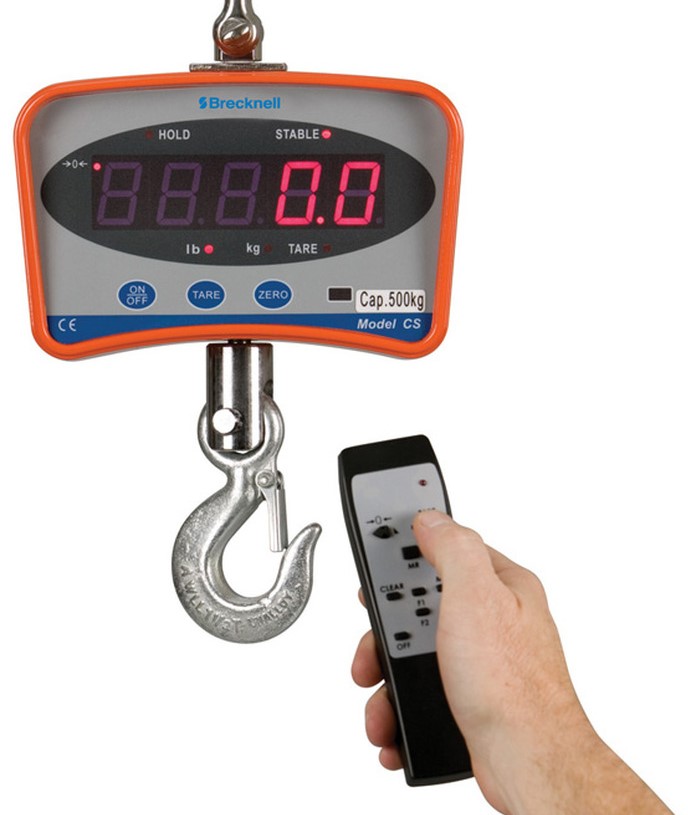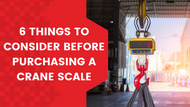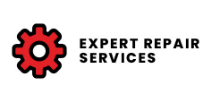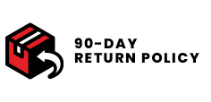6 Things to Consider Before Purchasing a Crane Scale
Posted by Greg J. on Nov 12th 2021
Crane scales are an integral part of many industrial operations, so finding the right one for your business is not a decision to be taken lightly. Of course, there are dozens of different manufacturers and hundreds of models to choose from, so where do you start?
Whether you’re in shipping and receiving, metal fabrication, or commercial fishing, we’ll help you find the best-suited scale for your unique weighing needs. To that end, here are the top six factors to consider when purchasing an industrial crane scale.
1. YOUR WEIGHING GOALS
Not every crane scale is designed to meet the needs of every weighing application. That’s why the first step in choosing a crane scale is to determine your main weighing goal(s).
When it comes to the use of crane scales, there are four primary weighing goals:
- Load Monitoring: The goal of load monitoring is to protect your employees and equipment by preventing crane accidents from occurring. When looking for a load monitoring crane scale, be sure that it is industry compliant and meets all OSHA, ANSI, ASME, and other required safety standards.
- Process Control: The purpose of a process control scale is to provide accurate, real-time weight measurements during one or more stages in your manufacturing or supply chain process. When shopping for this type of crane scale, it’s important that you choose one with full integration to your preferred data acquisition system.
- Data Integration: Data integration scales are designed to stream measurements directly from the weighing system to a customer database program to eliminate the use of paper records and reduce the amount of human error. The main thing to look for here is the level of precision and accuracy you need.
- Legal For Trade: A legal for trade (NTEP approved) crane scale is specifically intended for use in direct sales or monetary trade based on weight. The industries that commonly require NTEP crane scales are commercial fishing and steel manufacturing. When purchasing your crane scale, it's important to note if you will be buying or selling based on the weight measured by the scale.

2. YOUR AVERAGE LOAD WEIGHT
Arguably the most important thing to consider when choosing a crane scale for your operation is the average weight of the loads you intend to measure. It should come as no surprise that there’s a huge price and quality difference between a 100 lb. hanging scale and a 400,000 lb. tension dynamometer.
Just keep in mind that your average weight should not exceed two-thirds of the maximum capacity of the scale. That’s because most crane scales measure dynamic loads, so you need to account for any potential shifts in weight.
3. YOUR WORK ENVIRONMENT
When comparing crane scales, it’s incredibly important to consider your industry and the typical conditions in which the scale will be used. Say you work in a foundry or cold storage facility; you’ll want a scale that’s rated for use in extreme temperatures. On the other hand, if you’re going to use your scale at a dusty job site or on a commercial fishing vessel, you’ll want one that’s IP65-rated and has a fully-enclosed housing to keep out any water or debris.
4. VERSATILITY & COMPATIBILITY
The more functions a crane scale can manage, the more useful it’ll be to your operation. If your business ships internationally, for example, it’s a good idea to look for a model that allows you to easily change units from pounds to kilograms.
Another important aspect to consider is whether or not the scale is compatible with your type of crane. If the product description doesn’t list the compatible equipment, we recommend you contact the manufacturer before you commit to the purchase.
For reference, here are the five most common types of cranes and the industries they’re most popularly used in:
- Jib Cranes: Featuring a horizontal support and moveable hoist, jib cranes are often used in production facilities and machine shops.
- Bridge Cranes: Also known as overhead cranes, bridge cranes feature a trolley that moves laterally across a longitudinal-moving span. These are most often seen in manufacturing and maintenance applications.
- Monorail Cranes: As the most common crane variety, monorail cranes use chains or wire rope/cable to hoist heavy objects along a stationary, overhead track.
- Rail-Mounted Gantry (RMG) Cranes: With similar movement to a bridge crane, rail-mounted gantries consist of two A-frames connected at the top by an overhead cross rail. These are often found in large shipyards and steel mills.
- Semi-Gantry Cranes: A semi-gantry is a lot like an RMG crane, only with one unilateral-moving leg and the other end securely fixed. They are commonly used in rail and scrap yards.

5. PROXIMITY
How close will the scale operator be when weighing the loads? If they’re only going to be a couple of feet away, a small 1.2-inch LED display will do just fine. If they’re required to be further away—whether for practical or safety-related reasons—you’ll want something a bit larger and easier to read from a distance. Alternatively, you should look for a crane scale that supports wireless connectivity and remote control operation.
6. SAFETY & COMPLIANCE
While safety may be last on this list, it should always be the top priority of any work site. Crane scales are designed to handle incredibly heavy loads, so even the slightest slip-up can have devastating consequences.
When looking for a crane scale, it’s incredibly important that you choose one that is industry compliant and meets all OSHA, ANSI, ASME, and other state and local safety standards. In addition, many high-capacity crane scales need to be professionally installed, calibrated, and inspected at regular intervals, so make sure you’re aware of that before you buy.
FIND YOUR NEW CRANE SCALE AT SCALES PLUS
At Scales Plus, we have a huge selection of crane scales for almost any industry, application, and budget. If you need wireless connectivity, remote control operation, or just a basic crane scale, we have you covered.
If you’re looking for a quote or just have a question or two, you can give us a call at 616-622-2100 or send us an email and we’ll be happy to help.





